He was an outstanding leader. He won with the Pope and the Teutonic Knights, thanks to him the Jagiellonians ruled a large part of Europe, and his state grew to the size of over a million square kilometers! However, not always everything ran smoothly. Many times he was just one step away from a spectacular defeat.
In order to understand the phenomenon and the political feeling of the youngest son of Władysław Jagiełło, we must go back to 1440. Grand Duke Zygmunt Kiejstutowicz was murdered in Lithuania at that time. The local boyars, wishing to break away from Poland, proclaimed his successor 13-year-old Kazimierz, brother of King Władysław III of Varna. The protests of Poles surprised by this movement have been of no use. And since the election was made without the consent of the Polish monarch and the Seym, it could be considered a breach of the agreements already concluded by Kiejstutowicz.
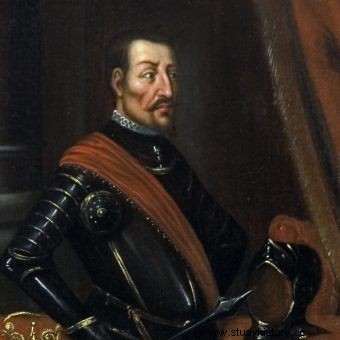
Casimir IV the Jagiellonian ruled in the years 1447-1492.
Obviously, the teenage prince was not in power at all. On his behalf, it was done by magnates headed by the powerful Jan Gierztołd. Only with time did Kazimierz gain experience. He learned the techniques of government and learned to get rid of opponents and schemers. He turned from a puppet to a true ruler. The measure of his independence will be the fact that he was the object of attacks seven times .
Meanwhile, in 1444, Władysław Warneńczyk died in the battle of Varna. He had no children, so his younger brother became a natural candidate for the throne. The Vistula nobility hoped that, in exchange for the crown, the prince would confirm and extend its privileges, and would again subordinate Lithuania to Poland. As a result, in August 1445, an envoy arrived in Vilnius with an invitation to Kazimierz. Unfortunately, the Jagiellonian found its form offensive. It was because numerous and rather complicated conditions were imposed on him.
No wonder the Grand Duke delayed his final decision. He argued that since the body of the previous king was not found, there could be no question of choosing a new one. Of course, he wasn't going to give up the crown, but decided to get it on his own terms.
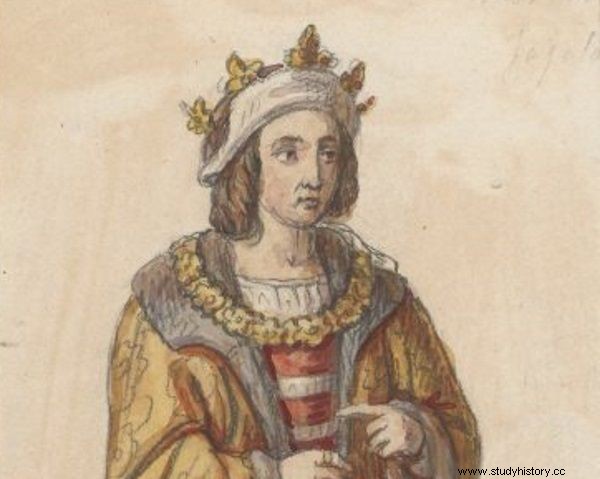
Kazimierz delayed accepting the Polish crown for three years.
Months passed, and the Polish nobles became more and more impatient. There were even a few candidates who would accept the throne without complaint. Kazimierz, however, made it clear: "if anyone would want to sit on the Polish throne despite his will, he will consider him his enemy and will try with all his strength to knock him off and banish him" . It was only in 1447 that he himself decided that his time had come. He was crowned on June 25 this year at Wawel. And so began his 45-year rule in Poland. What were his greatest achievements?
Teutonic Knights on their knees
Although the Battle of Grunwald ended with the full victory of the Polish-Lithuanian army, it did not bring the Teutonic Order to its knees. He was still strong, but deprived of the proceeds of the spoils of war, he felt financial problems more and more painfully. To remedy them, he raised taxes and levied duties. No wonder the frustration among peasants and townspeople grew stronger. At the same time, support for the incorporation of the monastic state into the Crown was growing.
In such circumstances, as early as 1440, the Prussian Union was established, a dynamic organization of Prussian nobility and towns, including the most important ones - Gdańsk and Toruń. Almost all centers of the Teutonic state joined him within a few months. The Order did not look idly at it:it tried to fight conspiracy with the help of the highest secular and ecclesiastical authorities. The papal legate in 1450 declared the members of the organization anathema, and the emperor abolished the Union three years later and sentenced 300 of its members to death.
In the monastic state, it literally boiled over. On February 4, 1454, the uprising began throughout Prussia. The castles passed into the hands of the Union, and the Polish king was approached by his emissaries asking for support. And they got them. The Jagiellonian declared war on the Teutonic Knights, officially announced the incorporation of their lands into the Crown, and granted the inhabitants of the new district the same privileges as in Poland. The war has started.
Already in the spring of 1454, the king and his army moved north. On the way, other cities paid tribute to him. But the monks were not going to lay down their arms either. Mercenary soldiers were reaching Prussia. The general clash took place on September 18 near Chojnice, where it turned out that the Polish mass mobilization had no chance in the fight against the professional army . The defeat was devastating. The Teutonic Knights began to regain the lost territories. Worse, the Kingdom treasury was now empty and the people were rioting against more taxes…
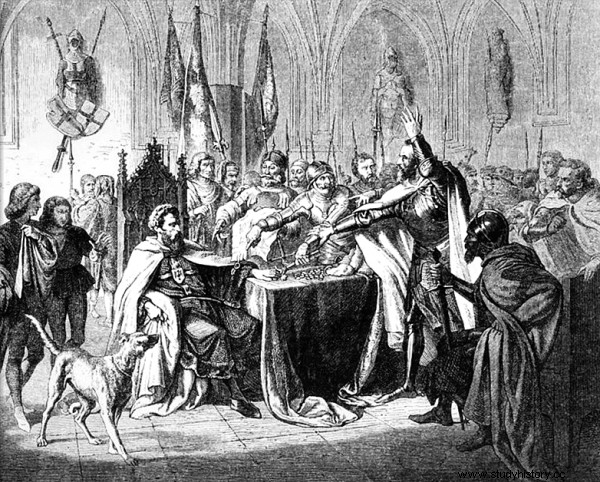
Kazimierz bought Malbork from a rebellious supporter of the Teutonic Knights, Ulryk Czerwonka.
Fortunately for us, the Teutonic Knights were in a similar situation. And they were the first to go bankrupt. Their mercenaries, anxious to get paid, even started attacking their employers! The culmination of these events was the act of the Czech commander Urlyk Czerwonka, who sold Malbork, Iława and Tczew to the Polish side .
Poland managed to avoid bankruptcy, but it was still a long way to the end of the war. Ultimately, Poland's victory was determined by handing over the command to Piotr Dunin in 1462. Already in September, on the Vistula Lagoon, the Poles captured all the Teutonic ships. And when Chojnice, the last Teutonic stronghold in Pomerania, fell in 1466, difficult peace talks began.
The treaty, which was signed on October 19, 1466 at the Artus Court in Toruń, marked the full triumph of the Crown. According to its provisions, Gdańsk Pomerania, the Chełmno and Michałów lands, as well as Malbork and Elbląg were Polish from that time on. The rest of the monastic state became a fief of the Kingdom. Moreover, each new grand master was obliged to pay his senior a feudal tribute. He was also unable to conduct foreign policy on his own and was to provide Poland with military aid at its every request .
War with the Pope
The role of popes in the Middle Ages cannot be overestimated. They not only acted as church leaders, but also acted as arbitrators in international disputes. They also tried to influence the politics of individual countries. After all, they had an extraordinary weapon with which they could "soften" their adversaries - a curse.
Meanwhile, Kazimierz IV Jagiellonian, from the beginning of his reign, pushed a model in which the secular power prevailed over the spiritual power. It was a truly revolutionary plan for those times. The king even went so far as to demand that the pope be allowed to fill church posts in the country. In the episcopate, he wanted people faithful to himself and not to the Pope.
It must be admitted that the monarch was lucky. Pope Nicholas V, who got involved in a dispute with Antipope Felix V, was very anxious to support him. In return, the Jagiellonian could freely select candidates for the dignity of clergy in Poland. He was also entitled to a portion of the sums collected for Rome.
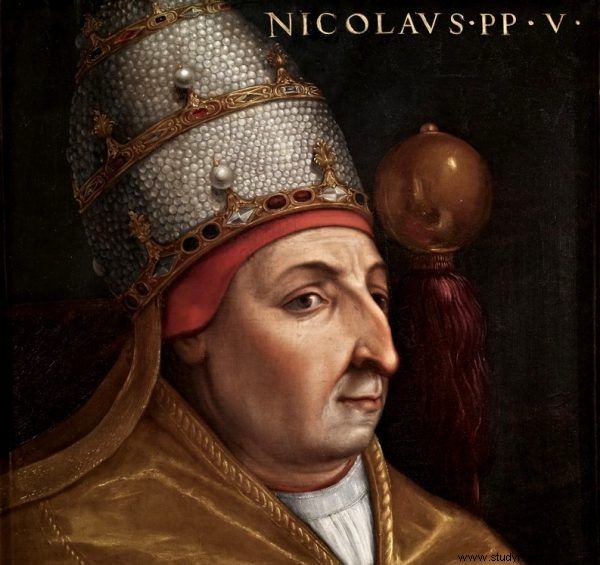
Kazimierz had a dispute with Pope Nicholas V over the right to fill church positions.
However, the alliance, which was inconvenient for the papacy, soon ended. As soon as Nicholas V was strengthened on the throne of Peter, he wanted to return to the previous state of affairs. It only infuriated the king, who consistently did his job and filled church offices with his own people.
The conflict reached its apogee in 1460, when the bishop's seat in Kraków became vacant. Kazimierz proposed for this position Jan Gruszczyński, and the Pope - then Pius II - Jakub of Sienna. The latter was consecrated, supported by some of the nobles of Małopolska. The king was furious. The nominee and his supporters lost their fortunes and were expelled from the country. And the monarch, as he tells in the book "Rulers of Poland. A story re-told ” postdoctoral doctor Piotr Węcowski, did not intend to step down:
Even the mediation of Pope Pius II's legate did not help. Ultimately, he was victorious in this dispute. In January 1463, he referred the matter to the verdict of the Seym in Piotrków, where the deputies were afraid to oppose him. Under such pressure, Jakub of Sienna humbled himself to Kazimierz and renounced the Kraków bishopric.
However, the Jagiellonian proved that he is an excellent politician. He appointed Jakub the bishop of Wrocław. With this gesture he drew the clergyman to his side.
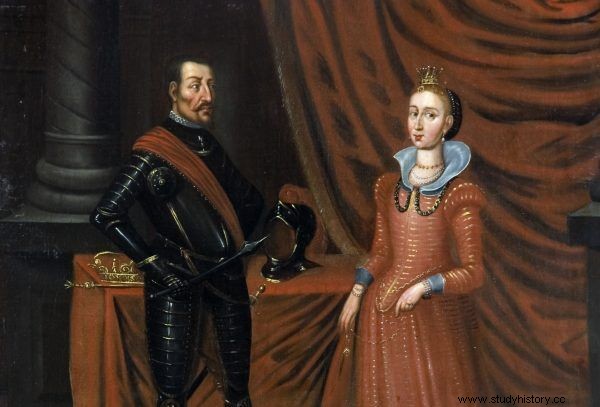
Kazimierz and Elżbieta Rakuszanka had thirteen children.
It should be added that the disputes over the appointment of church dignities did not always end according to Kazimierz's thoughts. In 1478 he tried to push Wincenty Kiełbasa's candidacy for the position of the bishop of Warmia. Ultimately, however, it was taken over by Mikołaj Tungen, supported by the Prussian nobility and townspeople. It was in line with the provisions of the Toruń peace treaty, so this time the monarch bowed.
The power of the Jagiellonians
Who, how who, but Kazimierz was able to take care of the future of his children. And he had quite a few. His wife, Elżbieta Rakuszanka née Habsburg, gained the honorable title of the Mother of Kings by no coincidence. She had thirteen children, eleven of whom survived the childhood period. It was an extraordinary feat for those times. Especially since out of six sons, four became kings and one was even declared a saint .
All the daughters were successfully married. Jadwiga married a Bavarian prince, Sophia married a Margrave of Brandenburg, Anna - a Pomeranian prince, Barbara - a Saxon prince, and Elżbieta - a Legnica prince. But their brothers were the king's key to creating the power of the Jagiellonians. He fought with weapons, money and influence for crowns for his male descendants.
Władysław, the first son of Kazimierz and Elizabeth, became the ruler of Bohemia in 1471. Though his claims for the crown were well-founded, his enthronement in Prague proved a complicated operation. As he reports in the book “Władcy Polski. A story re-told ” Piotr Węcowski:
In 1457, right after the death of Władysław the Pogrobowiec, Elisabeth's brother, who ruled both in Bohemia and Hungary, the Jagiellonians made a claim to the Czech throne. However, in both countries, the so-called national candidates, not associated with any dynasty - in Hungary Maciej Korwin, son of the famous leader János Hunyady, and in the Czech Republic, the Hussite magnate, Jerzy of Podiebrady.
How was it possible to secure the throne for the heir from Poland? Kazimierz decided to take the side of the Hussite king of Bohemia against the pope and the emperor. In 1462, in Głogów, he concluded a pact with Jerzy:in return for his support, he received an assurance that Władysław Jagiellończyk would receive the crown after Jerzy's death. So it happened and after nine years, in August 1471, the son of the Polish monarch sat on the Prague throne.
The King of the Vistula also fought for the Hungarian throne when Maciej Korwin died in 1490. He wanted his next son, Jan Olbracht, to sit on it. Ultimately, however, the crown fell to Władysław, who defeated his brother in the race.
Kazimierz - the best Polish ruler?
Kazimierz's reign was long and undoubtedly very fruitful. Let us remember that the beginnings of his reign were extremely difficult. For seven years - from 1440 to 1447 - the country had virtually no ruler. After his arrival from Lithuania, the Jagiellonian had to organize the entire system of power almost from the very beginning. The country needed to be strengthened and stabilized.
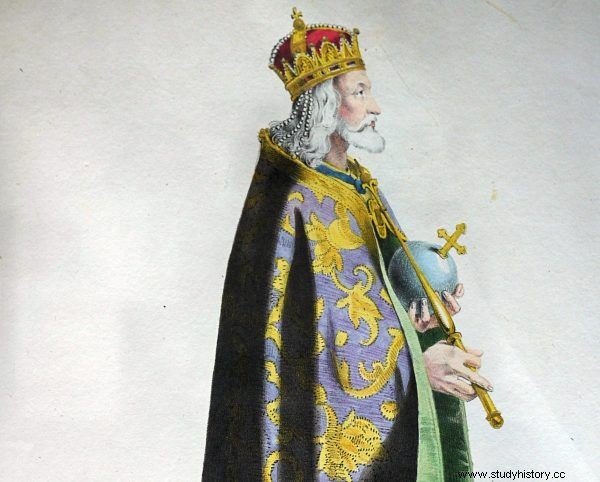
Kazimierz's son, Władysław Jagiellończyk, sat on the throne of Bohemia and Hungary.
There is no doubt that Jagiełło's son was a huge success. His dynasty's empire stretched from the Baltic to the Black Sea. At the time of the monarch's death in 1492, the Jagiellonians ruled Poland, Lithuania, the Czech Republic and Hungary. It is no coincidence that Kazimierz is considered one of the greatest rulers that Poland had.
But was he the greatest? Not necessarily. But perhaps the best assessment summarizing 45 years of his rule is the opinion of the eminent historian Paweł Jasienica:"Kazimierz was the most equal to the father, who was more than a head of Piasts."
